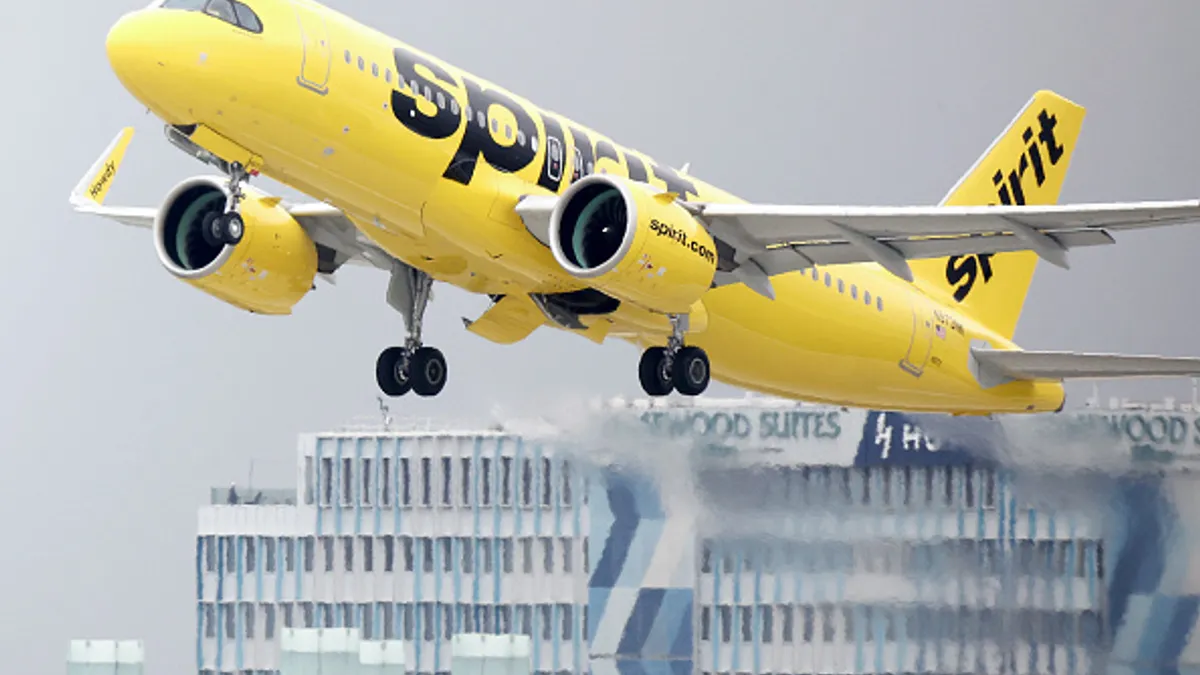Dive Brief:
- Pioneering budget carrier Spirit — known for low fares, bare-bones amenities and sometimes punishingly early flight schedules — filed for Chapter 11 bankruptcy protection Monday. The airline pivoted to reorganization after earlier failed efforts to reduce cost and navigate macroeconomic and industry-specific headwinds by merging first with Frontier Airlines and then JetBlue, according to a court filing made by its CFO Fred Cromer.
- The Dania Beach, Florida-based company’s finance chief said a “swift Chapter 11 process” is expected, one that includes a reorganization plan that was agreed to by “consenting stakeholders” who hold approximately 80% of the debt that will be restructured, according to the filing. With $300 million in debtor-in-possession financing from existing bondholders, the company said the the deleveraging transaction would “equitize” $795 million of funded debt, according to a company release.
- “The airline industry...is contending with shifting consumer demand and operational headwinds, such that it is unrecognizable from what it was was pre-pandemic,” CFO Cromer wrote in a declaration filing, pointing to increased competition for budget conscious travelers that are Spirit’s bread and butter, business travel that still remains below pre-pandemic levels, and manufacturing issues and maintenance recalls. “Taken together with inflationary and other macroeconomic headwinds, airlines are facing increased unit costs, and low-fare carriers — whose business models rely on much slimmer margins — are disproportionately affected.”
Dive Insight:
The seventh-largest U.S. airline said Monday that flights, ticket sales, reservations and all other operations would continue as normal. “Spirit expects to continue operating its business in the normal course throughout this prearranged, streamlined Chapter 11 process,” it said in the release. As of the petition, the airline had $3.6 billion in total outstanding debt, 21,000 employees and independent contractors, and a fleet of 213 A320 aircraft, 51 of which are owned by Spirit, according to the filing.
In his first day declaration filing, which are sometimes penned by CFOs, Cromer described a company with Midwestern roots that developed a pioneering approach to airfare pricing decades ago. It was founded in 1964 as Clippert Trucking Company, a Michigan corporation, and went on to take the Spirit Airlines name in 1992. It relocated to Florida in 1994.
Spirit began operating what Cromer characterized as an “ultra low-cost carrier” nearly 20 years ago. Its business model was simple: it unbundled components of airfares that were typically included in airline tickets, allowing its flying customers to “save by paying only for the amenities they choose, such as baggage, seat assignments, priority boarding refreshments, and WiFi.”
However, he noted that recently the company has introduced new offerings or “premium selections,” as it seeks to adapt to changing market conditions and offer “an even friendlier, more comfortable and cost-effective travel experience.”
Cromer, who took the finance reins of Spirit in July, is a 30-year veteran of the airline industry. He was previously CEO of Xwing, a developer of advanced autonomy systems for aviation and defense, and has served as president of Bombardier Commercial Aircraft, president of International Lease Finance Corp, and vice president and CFO of ExpressJet Airlines.
Spirit’s Chapter 11 comes as large bankruptcies have been on the rise, CFO Dive previously reported. The number of big U.S. companies with more than $100 million in assets that filed for either Chapter 7 or Chapter 11 bankruptcy protection in the 12 months ending July 30 rose 8% to 113 compared to the prior 2022-2023 year-over-year period, a volume well above the historical annual average of 79.2 seen between 2005 and 2023, according to a report published last month by consulting firm Cornerstone Research.












